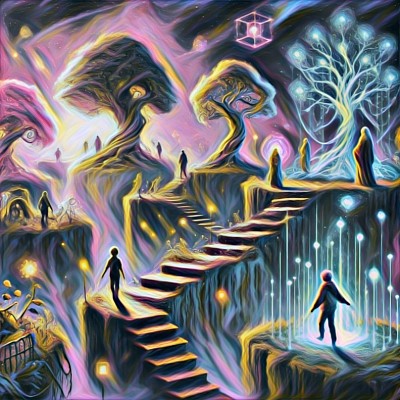A Vision Through the Mist
Community-Driven Solutions
Finding Camelot is a nonprofit organization dedicated to creating cooperative housing communities that empower individuals and families through affordable living, shared responsibilities, and personal growth.
Our mission is to foster emotional intelligence, heal generational trauma, and promote economic empowerment by providing sustainable solutions for the working classes.
By prioritizing people over profit, we aim to build a culture where everyone has the opportunity to thrive emotionally, socially, and spiritually. We are:
- A network of cooperative households owned by the nonprofit, renovated through tax-deductible donations.
- A system that allows people to live together peacefully in close quarters, starting with a single household and expanding from there.
- A model that reduces the cost of living through cooperation, enabling members to control how their labor is applied.
- A movement that empowers the working class by fostering collective bargaining on a massive scale.
Membership Housing: Affordable Living for Modern Families
$500/month - Deluxe Membership
- Two Room Credits
- All Utilities (electric, water, gas, waste, WiFi)
- Household Streaming and Delivery Services
- 25-30% of Grocery Budget
$250/month - Basic Membership
- One Room Credit (Unmortgaged Properties Only)
- All Utilities (electric, water, gas, waste, WiFi)
- Household Streaming and Delivery Services
$250/month - Dependent Add-on
- Accommodations for up to 2 minor dependents
- Childcare included/CareShare
- Meals included (Self-Prep)
Household Complexes
- Single-family homes purchased and renovated by Finding Camelot using tax-deductible donations.
- Occupied and maintained by members, ensuring sustainable living and community upkeep.
- Designed for seamless transitions, allowing members to move between homes without disruption.
- Equipped for cooperative living, balancing privacy with shared responsibilities.
- Self-sustaining financial model, where membership fees cover household expenses, not profit.
- A foundation for growth, expanding into a larger network of cooperative housing.
Logos Nostos Estates for Modern Community Living
- A blend of estate manor and community center, designed for comfortable living, childcare, and entrepreneurship.
- Communal meal program: Members take turns preparing meals, shared dining hall, leftovers stored for later.
- MealShare Program: Expanding communal meals into a sustainable food resource.
- Extended Foster Program for Teenage Mothers: Provides young mothers and their children with love, stability, and support.
Dependent Lodging: Designed for Growth
- Sponsors Room (under 1): from birth until guardian's choice, age 1 at the earliest, a child sleeps in the member's room.
In Household Complexes: Specfic accommodations depend on need and availability in renovated single-family homes.
In Logos Nostos Centers: Purpose-built dependent quarters:
- The Nursery (Ages 1-6): Full supervision, no assigned chores, focus on early development.
- The Bunkroom (Ages 7-12): Shared responsibility, cooperative learning through natural consequences.
- The Dorms (Ages 13+): Near full autonomy, structured independence with personal and group responsibilities.
Collaborative Parenting: Building Accountability Together
- We can't control what others do but we can encourage and support them.
- Gentle accountability through democratic policy and grievance resolution.
- Childcare provided through a rotating household schedule.
- Exposure to multiple parenting styles allows children to form their own perspectives.
Building Trust: Our Community Governance Model
- The first household = the initial board of directors.
- Board membership requires active household membership.
- Monthly membership fees go directly to household operations only.
- Payments managed transparently through a cash app account.
- Board members also handle public relations through social media.
Authentic Living: A Proven Model for Sustainable Life
- No gimmicks. No pitches. Just a working system for a better way of life.
- Watch how it works. See the proof. Make a choice.
Finding Camelot isn't t just an idea, it's the future of sustainable, cooperative living.
Legal System Reform: A Crucial Step Toward Empowerment
At Finding Camelot, we recognize that economic stability and social healing are impossible without addressing the deep-rooted injustices in our legal system. The working class is disproportionately affected by:
- Predatory fines and fees that turn minor infractions into financial crises.
- Disproportionate incarceration that removes wage earners from their families and communities.
Our advocacy for legal system reform is central to our mission.
A just system should:
- Prioritize rehabilitation over incarceration, ensuring that mistakes do not lead to lifelong punishment.
- Uphold due process over expediency, preventing abuses of power that target the most vulnerable.
- Hold those in power accountable, so the system serves the people rather than exploiting them.




